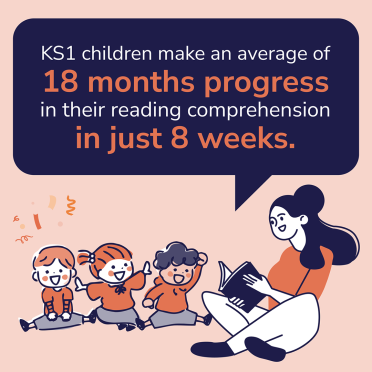What is the Key Stage 1 (KS1) Reading Fluency Project?
‘The national curriculum for English aims to ensure that all pupils read easily, fluently and with good understanding…’
National Curriculum in England: English Programme of Study
The Key Stage 1 (KS1) Reading Fluency Project is designed to support struggling readers in years 2 and 3 make swift and dramatic gains in their reading attainment. Through the combined use of evidence-informed reading strategies and high-quality texts, the Key Stage 1 (KS1) Reading Fluency Project not only increases the number of pupils achieving the Expected Standard in reading at the end of key stage 1, but fosters enthusiastic, confident readers who show increased pleasure and skill when reading challenging texts across the curriculum.

Project aims
The Key Stage 1 (KS1) Reading Fluency Project is designed to equip teachers with the knowledge and skills they need to make a difference to outcomes for their most vulnerable learners, those who are reading below the Expected Standard (the lowest 20%*).
Training is logically sequenced and carefully spaced to allow time to put learning into practice throughout the 8-week intervention period. Equipped with project strategies, teachers deliver two, twenty-minute sessions weekly to a selected group of struggling readers. In just 8 weeks, these pupils make incredible progress in their fluency, leading to great gains in their accuracy and comprehension. Furthermore, pupils develop confidence and begin to view themselves as authentic readers.
In The Reading Framework: teaching the foundations of literacy document, the DfE states that “Fluency and enjoyment are the result of careful teaching and frequent practice. Ensuring children become fluent and engaged readers at the very earliest stages also helps avoid the vicious circle of reading difficulty and demotivation that makes later intervention more challenging.” Our project focuses on improving outcomes - and fostering pleasure and motivation for reading - through carefully crafted core strategies to develop fluency and comprehension.
The exceptional progress that can be achieved in just 8 weeks, is evident in this video of a year 2 pupil, from English Martyrs' Catholic Primary School, reading before and after the school’s involvement in the project.
Ofsted guidance on inspecting maintained schools and academies in England under the education inspection framework.
Schools requesting inspection (section 42): On inspections of infant, junior, primary and lower-middle schools, inspectors will carry out a deep dive to evaluate how well pupils are taught to read. They will pay particular attention to pupils who are reading below age-related expectations (the lowest 20%) to assess how well the school is teaching phonics and supporting all children to become confident, fluent readers. School Inspection Handbook, Ofsted
Learn more about reading fluency
Fostering fluency and comprehension in Key Stage 1 reading
Reading between the lines: developing reading fluency for comprehension
Reading fluency across the primary curriculum
Tightening the (Scarborough) rope for reading fluency
What does reading fluency look like in KS1?
Reading fluency? How do I teach that?
Reading fluency: training for teachers
A field guide to reading fluency: a reader's digest of our work to date
EdTalks podcast with Alex Quigley and Sarah Green from the Education Endowment Foundation
Key Stage 2 (KS2) Reading Fluency Project
It was so useful to have the trainer watching our videos and seeing us in practice. The advice was fantastic and improved how I continued the intervention.
Elizabeth Kirby - Teacher at Weeth Primary School
A very well-presented course with knowledgeable, enthusiastic leaders. Thank you!
Becky Adler – Teacher at Heritage Park Primary School.

